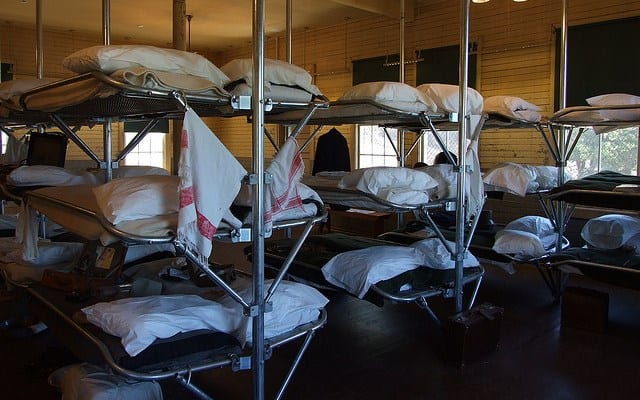 In 2013 the Senate passed a bipartisan bill for comprehensive immigration reform. However, the bill was stopped in the House when Speaker Boehner refused to bring it up for a vote, despite bipartisan support. Now the president is considering providing immigration relief through executive actions, and advocates hope to have a chance for reform in 2015.
In 2013 the Senate passed a bipartisan bill for comprehensive immigration reform. However, the bill was stopped in the House when Speaker Boehner refused to bring it up for a vote, despite bipartisan support. Now the president is considering providing immigration relief through executive actions, and advocates hope to have a chance for reform in 2015.
While the Senate and House bills under consideration and executive actions would solve many of the problems of our broken and cruel immigration system, they do not end detention of migrants. This practice is legally supported by Congress under the “bed mandate,” which stipulates that the Department of Human Services (DHS) “shall maintain a level of not less than 34,000 detention beds through September 30, 2014.” There is wide agreement within government agencies that the mandate is arbitrary; it does not follow actual detention needs, and that level of incarceration is vastly excessive. This mandate was introduced into the 2010 DHS appropriations bill by the late Senator Robert Byrd (D-WV) without public comment, and the quota has increased each year since it was first introduced. Last year Congressmen Deutch and Foster introduced an amendment to repeal the bed mandate, but it failed to pass, despite wide support by the House and the administration.
Under the bed mandate, ICE is obliged to incarcerate migrants who do not pose a threat to public safety. As a consequence, families are torn apart. Parents, pregnant women, and children, many of them asylum seekers and victims of violence, are incarcerated indefinitely in privately run prisons that put a price tag on immigrants’ lives.
Incarceration is excessively costly for taxpayers and profitable for corporations. ICE spends $160 a day per detainee, while alternatives to detention cost between $0.07 and $17 per day. The GEO Group, ICE’s contractor, has seen revenues triple since 2002.
The bed mandate puts ICE in the position to contract with corporations like GEO, which have incurred human rights violations within their facilities and submit detainees to inhumane conditions.
In May, Rep. Adam Smith introduced the Accountability in Immigration Detention Act (H.R.4620) as a response to the demands of the hunger strikers at the NWDC. This bill not only addresses the concerns of the detainees but also eliminates the bed quota with this statement: “The number of detention beds maintained shall be determined by the Secretary of Homeland Security and shall be based solely on detention needs.”
Eliminating the bed mandate and expanding alternatives to detention remain crucial aspects of any immigration reform that wants to protect vulnerable immigrants from becoming an object for profit. To this end, the role of community members is crucial. Contacting our representatives to demand an end to the bed quota and a better use of taxpayer dollars through alternatives to detention will have a deep impact in protecting men and women like Ramón and their families.
A native of Chile, Maria-José Soerens is a licensed mental health counselor who works with undocumented migrants and their families in Washington State. She is the founder of Puentes: Advocacy, Counseling & Education and currently teaches in the master’s in theological studies program at Centro de Estudios Teologicos Interdisicplinarios.
Learn, Pray, Reach Out: 8 things you can do right now
On detention:
① Call and/or visit your representatives, urging them to support the Accountability in Immigration Detention Bill.
② Follow the Detention Watch Network’s Campaign at #endthequota.
③ Detention of migrants has become a problem on a global scale. Go to GlobalDetentionProject.org for more information.
④ Read the UNHCR’s Beyond Detention: A global strategy to support governments to end the detention of asylum-seekers and refugees.
⑤ Write letters to and/or visit detainees in your community.
On immigration reform and immigration justice:
① Follow EvangelicalImmigrationTable.com for more information and updates.
② Follow #pray4reform.


